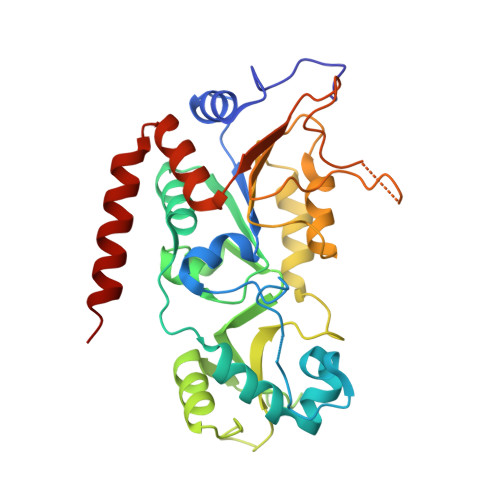X-ray crystal structure guided discovery of new selective, substrate-mimicking sirtuin 2 inhibitors that exhibit activities against non-small cell lung cancer cells.
Yang, L.L., Wang, H.L., Zhong, L., Yuan, C., Liu, S.Y., Yu, Z.J., Liu, S., Yan, Y.H., Wu, C., Wang, Y., Wang, Z., Yu, Y., Chen, Q., Li, G.B.(2018) Eur J Med Chem 155: 806-823
- PubMed: 29957526
- DOI: https://doi.org/10.1016/j.ejmech.2018.06.041
- Primary Citation of Related Structures:
5YQL, 5YQM, 5YQN, 5YQO - PubMed Abstract:
Human sirtuin 2 (SIRT2) is a nicotinamide adenine dinucleotide (NAD + )-dependent deacylase, and is implicated in human diseases including cancer. Selective small-molecule inhibitors for SIRT2 are sought as chemical tools and potential therapeutics. Here we report the X-ray crystal structure guided structure-activity relationship studies of new N-(3-(phenoxymethyl)phenyl)acetamide derivatives with SIRT2, which led to the identification of potent, selective SIRT2 inhibitors. Crystallographic analyses reveal that the new inhibitors act via inducing the formation of an enlarged hydrophobic pocket and particularly mimicking the interactions made by myristoylated-lysine substrates. The most potent inhibitor 24a could dose-dependently elevate the acetylation level of α-tubulin in the non-small cell lung cancer H441 cells, which have a high expression level of SIRT2 as determinated by Western blotting analyses. Further cellular assays reveal that 24a restrains cell growth mainly through inhibiting cellular proliferation rather than inducing apoptosis. Moreover, 24a could suppress the migration and invasion of H441 cells. These results provide an excellent basis for further development of new potent, selective, and cell active SIRT2 inhibitors as chemical tools and potential therapeutics for SIRT2-driven non-small cell lung cancers.
Organizational Affiliation:
Key Laboratory of Drug Targeting and Drug Delivery System of Ministry of Education, West China School of Pharmacy, and State Key Laboratory of Biotherapy and Cancer Center, West China Hospital, West China Medical School, Sichuan University, Chengdu, 610041, China; College of Food and Bioengineering, Xihua University, Sichuan, 610039, China.

















